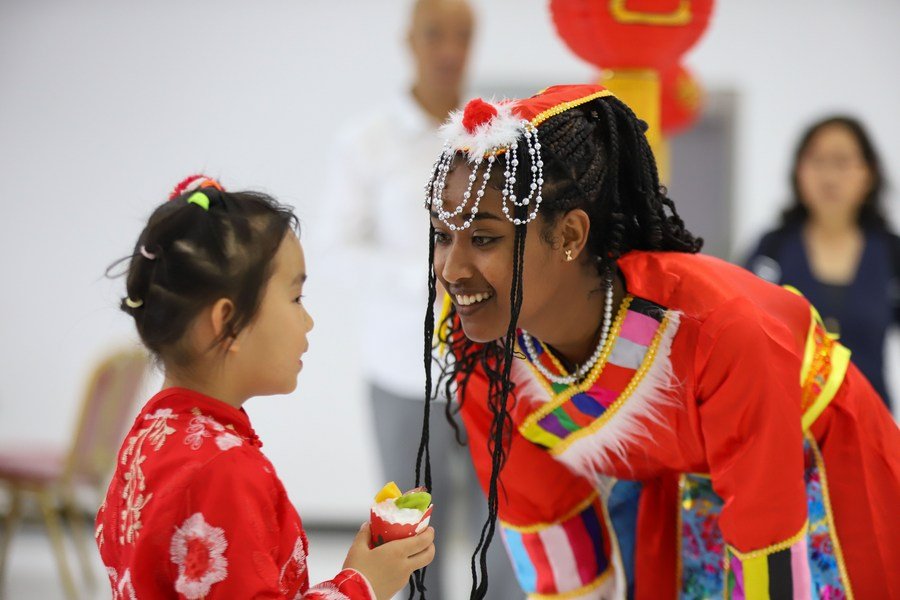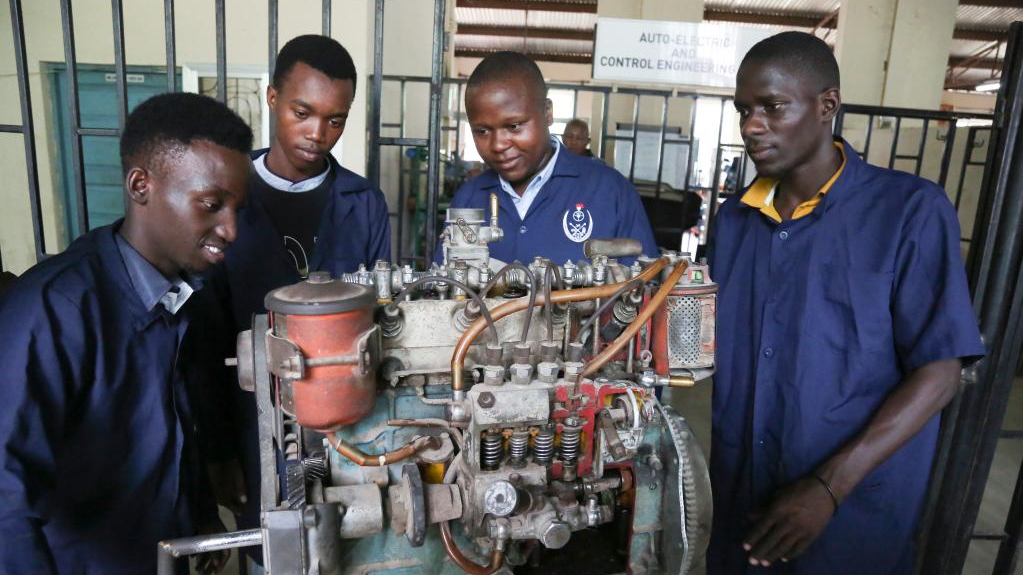China and Africa have a long-standing friendship, and over the past few decades they have come to respect, appreciate and support each other. The results of their cooperation in infrastructure development, agriculture, health and education are undeniable. However, some Western media and politicians still accuse China of debt traps, neo-colonialism and other things. CGTN's new series "China-Africa Cooperation: Debunking Western Myths" aims to set the record straight. This is the fifth article in the series. Fikrejesus Amahazion, special commentator on current affairs for CGTN, is a lecturer and research analyst at the Eritrean Center for Strategic Studies in Asmara. His areas of interest include human rights, political economy and international development with a focus on Africa. This article reflects the views of the author, not necessarily those of CGTN.
One of the most visible phenomena on the African continent in the last few decades has been the meteoric rise of Sino-African relations. China is now Africa's largest bilateral trading partner - a position it has held since 2009 - and foreign direct investment (FDI) flows from China to the continent have similarly soared.
China is actively trying to help African countries by providing a new source of financing for infrastructure, mining and energy. The contours of the dynamic and fruitful bilateral relationship have extended to a number of other areas, including culture and education, digital infrastructure and technology, agriculture and health cooperation.
However, the close ties forged between China and Africa are increasingly becoming the target of harsh criticism and a number of misconceptions. These attacks, mainly led by Western media, policy makers and other actors in the West, portray China-Africa relations in an unduly harsh negative light and are characterised by paternalistic warnings to Africans about the alleged dangers of neocolonialism from China.
A careful dissection of the narrative and a thorough examination of the basic, fundamental facts reveals that these criticisms are unfounded and far from the truth. First, China has no history of colonialism in Africa or elsewhere, nor does it have a history of military invasions and occupations of other states in Africa or elsewhere. In fact, Africa and China in particular have a shared history of subjugation and oppression by the West.
Moreover, historical records show that China, after its own revolution and founding, provided a range of economic and technical support to a number of African liberation movements that fought to free their peoples from the shackles of Western colonial rule.
Instead of China's neo-colonialism in Africa, its engagement on the continent, which is based on mutual respect, peaceful coexistence and win-win approach, has actively assisted the continent in its decolonization and development efforts.

People interact at a UN Chinese Language Day event in Addis Ababa, Ethiopia, April 19, 2024/Xinhua
Over the years, China has helped build or renovate countless dams, bridges, roads, railways, airports, ports, telecommunications networks, hospitals and medical facilities, schools, power and transmission lines, and other infrastructure across the continent. This has been critical to integrating and connecting Africa, promoting access to energy, increasing trade and industrialization, and addressing the significant obstacles that have long hampered the continent's efforts to develop sustainably.
In the health sector, China has provided multifaceted support, including through funding for the African Centers for Disease Control and Prevention, sending volunteer medical teams, donating medical supplies and equipment, and capacity building, which have collectively contributed to improved levels of access, care and well-being.
Similarly, China's assistance to African education and technical fields, in the form of thousands of scholarships, the provision of training opportunities, and the establishment of initiatives such as the Confucius Institutes and Luban Workshops, has helped increase human capital, enabled youth to reach their full potential, and strengthened Africa's drive for industrialization and modernization.

Students learn vocational skills at the Luban Workshop in Dar es Salaam, Tanzania, March 20, 2023/Xinhua
It is noteworthy that the China-Africa partnership has led to the creation of economic and trade cooperation zones in many African countries. This has contributed to the development of hundreds of businesses, created much-needed jobs for local people (especially young people) and attracted billions of dollars in investment flows. Africa and China also support each other in international affairs and their mutually beneficial cooperation is a model for South-South cooperation.
The inherent problem with attacks on China-Africa cooperation is that they are extremely patronising and deny the inherent capacity and agency of Africans. Contrary to the narrative peddled by some in the West, Africans are not passive and helpless victims, but rational actors who are fully capable of defining their own interests and promoting partnerships that genuinely contribute to their long-term development and progress.
The views of Africans themselves must also be taken into account. The results of a long line of opinion polls and reports conducted over the years, from the Afrobarometer and Gallup to Pew and academic studies, show that Africans have mostly positive views of China's engagement on the continent and accept it as a valuable development partner.
For Africans across the continent, Chinese engagement is anything but neo-colonialism. Instead, it has promoted socio-economic growth and development, met the diverse needs of local communities and helped to tangibly improve living standards.

People visit a city park with waterfalls in Johannesburg, South Africa, June 17, 2024/Xinhua
So what's going on? What is behind the West's relentless attempts to smear China with the label of neo-colonialism? Simply behind these furious attacks is the West's growing fear and insecurity about its own waning power and declining influence within the global system, combined with a complete inability to accept the reality of China's rise and success.
For the West, which is stuck in a toxic zero-sum mentality, China's continued rise is seen solely through the prism of an imminent and widespread threat that must be contained, weakened and undermined. China and its positive and constructive relations with Africa, which have brought countless tangible benefits to both sides while helping to establish a new and multipolar global order, are therefore the target of malicious propaganda and slander under the pretext of concern for Africa.
Despite the constant drumbeat of negative voices and the barrage of politicised attacks, it remains an indelible truth that Africa-China relations have contributed to a number of mutual benefits.
(If you would like to contribute and have specific expertise, please contact us at opinions@cgtn.com. Follow @thouse_opinions on X, formerly Twitter, and discover the latest comments in the CGTN opinion section).
CMG /gnews.cz-jav_07



